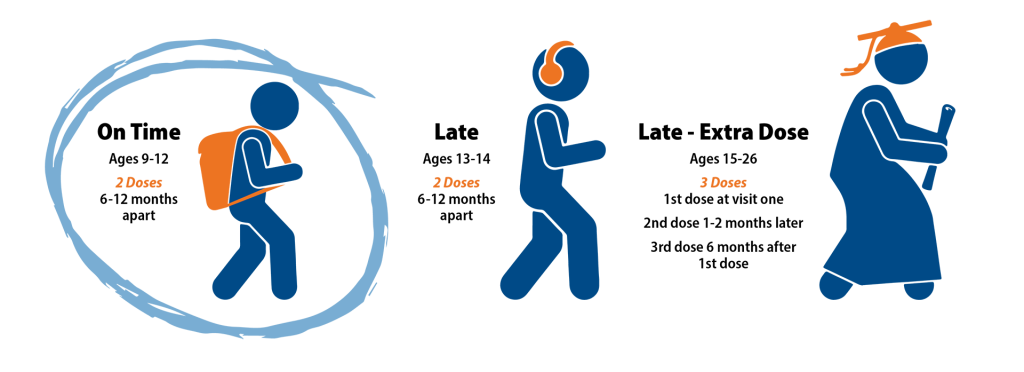A common misconception about the HPV (Human papillomavirus) vaccine is that only girls need to receive it to protect them against cervical cancer. What some people may not know, is that HPV vaccination can prevent other HPV-related cancers that can affect males, too. These cancers include oropharyngeal (throat, tonsil and tongue), anal, and penile cancer. Throat, tonsil, and tongue cancers now exceed cervical cancer as the most common cancer types caused by HPV, and men account for four out of five new cases of these types of cancer.
The West Virginia Immunization Network encourages West Virginians to protect their preteens and teens from HPV-related cancers by getting them vaccinated against HPV. Follow along as we highlight three reasons why it’s important for boys and young men to be vaccinated against HPV.
1) HPV infection can cause cancer in males.
For males, HPV infection can lead to penile, anal, and oropharyngeal (throat, tonsil and tongue) cancers. In fact, the number of new cases of head and neck cancers being linked to HPV is on the rise. There are now more cases of head and neck cancers than cervical cancer, and HPV infection has been found to cause about 70% of these oropharyngeal cancer cases. Head and neck cancers are over three times more common in men than in women.
2) HPV vaccination can prevent cancer in males.
The HPV vaccine prevents the nine types of HPV that most commonly cause cancer in males and females. Studies have shown that HPV vaccination can prevent more than 90% of cancers caused by HPV when given at the recommended ages. The HPV vaccine is safe, effective, and provides long-lasting protection against cancers caused by HPV, including penile, anal, and oropharyngeal cancers.
3) Timing is everything.
The HPV vaccine works best when it is given before any exposure to HPV. The American Cancer Society and the American Academy of Pediatrics recommend the HPV vaccine for boys and girls beginning at age 9. Two doses of the HPV vaccine are recommended, 6 to 12 months apart, for teens less than 15 years of age.  
If HPV vaccination is started at age 15 or later, then the HPV vaccines are given in a series of 3 shots over a six-month period. For the best protection, your child should receive all of the doses recommended for their age.
Where to get the HPV vaccine.
In West Virginia, children 9 years of age and older can receive HPV vaccines at their health care provider’s office, a community health center, the local health department, pharmacies, and at some school-based health clinics.
Most health insurance plans cover preteen and teen vaccination. The Vaccines for Children (VFC) program also provides vaccines for children 18 years and younger who are uninsured, underinsured, Medicaid-eligible, American Indian, or Alaska Native. Contact your child’s health care provider or a local health department for more information about the VFC program.
For more information about HPV vaccination, visit www.cdc.gov/hpv/index.html or contact a health care provider.
